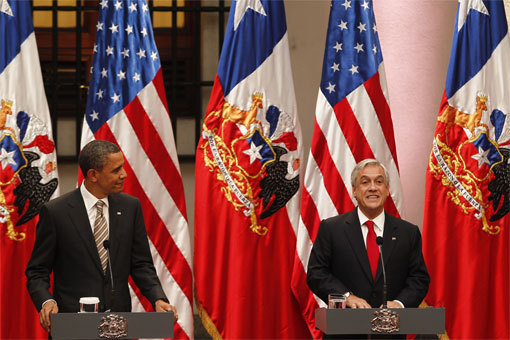President Obama’s trip to Latin America can be broken down as an essentially successful visit to Brazil and an uneventful trip to Chile and El Salvador. Unfortunately, the disappointing visit to Spanish-speaking Latin America has cast a shadow on the accomplishments achieved in Brazil.
The main oversight of the trip is that Latin America should no longer be considered a homogenous region, and U.S. presidents should refrain from speaking to all of Latin America. The region is much more dynamic than that. Political and economic developments have created huge, cross-country differences in ideology and socioeconomic realities. Mexico, for example, has a relationship of mutual dependence with the U.S. such that American presidents no longer deal with Mexico as part of Latin America. From NAFTA to unauthorized immigration, from trade issues to drug trafficking, Mexico has a much more diverse agenda with the United States than any other Latin American country.
The rest of the region has an equally diverse agenda with the United States. Cuba’s relationship with the U.S. is still trapped in Cold War logic. Haiti depends largely on the success of the UN peacekeeping mission. Colombia is after a free-trade agreement with the U.S. while Venezuela and Bolivia have deep political and ideological differences with their northern neighbor. Central American countries worry about immigration policy much more so than Argentina or Uruguay. For Chile, a top concern is elimination of visa requirements for their nationals visiting the U.S.—a request that would be unthinkable for the Dominican Republic.
The U.S. President’s visit was framed around the importance of engaging the region as an economic and trade partner. This is a reflection of the region’s solid economic growth and its ability to weather the global economic downturn. At the same time, uneven economic growth has generated huge gaps in the development paths between countries. Chile’s per capita GDP in real terms is 12 times larger than that of Nicaragua.
These unique political, social and economic circumstances mean that it is now impossible to send the same message to all countries in Latin America and expect that it will be received as responding to the individual priorities of any of its intended recipients.
President Obama’s visit to Brazil was more successful because he addressed issues of concern to Brazil. In discussing energy policies and trade expansion and acknowledging the increasing role Brazil wants to play in the international arena, Obama had a message custom-made for Brazil today.
But the message was far more general in the speech to the region delivered from Chile. Obama chose Chile because the bilateral relationship has few pending issues, and the administration was confident that the visit would not be tainted by any criticism.
Had Obama chosen Colombia for his Latin American address, a debate over the convenience of Plan Colombia, the delay in approval of the free-trade agreement and tensions with the Bolivarian initiative led by Venezuelan president Hugo Chávez would have been inevitable. Peru could have been a good alternative to Chile. After all, the country has grown faster in the last 10 years than any other in Latin America. The U.S. and Peru signed a free-trade agreement that is producing positive results. On the political front, Peru’s democracy has consolidated far beyond what was expected 10 years ago when Alberto Fujimori was forced out of office. But any visit to Peru would have been stained by U.S. drug policies. This left Chile; a somewhat neutral territory among the United States’ closest friends in the region.
In delivering a message intended for all Latin America, Obama understandably disappointed Chileans. They were proud to be the chosen country. But the message was mostly empty of real proposals, symbolically timid and not really different from what Obama said in 2009 at the Summit of the Americas in Trinidad and Tobago. The Santiago speech will only be a footnote in the history of U.S. Latin American relations.
In his message, Obama repeated that he wants an equal relationship with Latin America, without “senior or junior partners.” However, images speak louder than words. The very fact that the security apparatus around him was far more sophisticated than that of any Latin American president was a reminder that the U.S. cannot be easily treated as an equal partner.
Obama also went over a laundry list of issues that concern different Latin American countries—from the lack of democracy in Cuba, to security and drug issues, and to trade and immigration. Together, the laundry list included items of interest to all countries. But it did not amount to a coherent regional policy or a well-structured road map for the future.
This trip should provide President Obama with a lesson for U.S. policy toward the region. Future presidential trips should be less ambitious in their reach and more country-specific in their agendas and proposals. Trips like that will achieve less regional notoriety but will produce more concrete results. A more limited agenda will in fact prompt those countries not visited to seek stronger relations with the powerful partner to the north. Instead, this trip left Brazilians generally satisfied and the rest of Latin America somewhat disappointed.
In seeking a narrower reach, the U.S. can end up achieving more in moving U.S.-Latin American relations forward.









